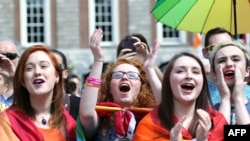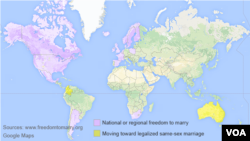Ireland became the first country in the world to adopt same-sex marriage by popular vote as 62 percent of the electorate backed a referendum, official results showed on Saturday.
More than 60 percent of eligible voters cast their ballot, the highest turnout at a referendum there in over two decades.
"I'm so proud to be Irish today," Ireland's Equality Minister Aodhan O'Riordain said earlier Saturday, predicting his country had voted in favor of allowing same-sex marriage in a historic referendum in the traditionally Catholic country.
Such a dramatic social shift in Ireland comes just two decades after the country decriminalized homosexuality.
Countries That Have Legalized Gay Marriage
Countries that have legalized gay marriage
2001 - The Netherlands
2003 - Belgium
2005 - Canada, Spain
2006 - South Africa,
2009 - Norway, Sweden
2010 - Argentina, Iceland, Portugal
2012 - Denmark
2013 - Brazil, England, France, New Zealand, Uruguay, Wales
2014 - Luxembourg, Scotland
2015 - Ireland, United States
* In 2017, Finland's same-sex marriage law will take effect, but its parliament approved the legislation in 2014
Countries with regional freedom to marry
Mexico
Countries moving toward legalized same-sex marriage
Australia, Colombia, Slovenia
Sources: www.freedomtomarry.org
"We're the first country in the world to enshrine marriage equality in our constitution and do so by popular mandate. That makes us a beacon, a light to the rest of the world of liberty and equality. So it's a very proud day to be Irish," Leo Varadkar, a Cabinet minister who came out as gay at the start of a government-led effort to amend Ireland's conservative Catholic constitution, told The Associated Press.
"There is going to be a very substantial majority for a yes vote. I'm not at all surprised by that to be honest with you," Irish Sen. Ronan Mullen, one of only a handful of politicians who campaigned for rejection, told the AP.
“This has really touched a nerve in Ireland,” Equality Minister Aodhan O'Riordain told Reuters at the main count center in Dublin. “It's a very strong message to every LGBT [lesbian, gay, bisexual, and transgender] young person in Ireland and every LGBT young person in the world.”
Political analyst Noel Whelan noted that "yes" majorities were being reported even in conservative rural districts and suggested the only question was how large the "yes" majority would be when all ballots in this predominantly Catholic nation of 4.6 million are counted.
The predicted "yes" outcome is due, in part, to thousands of young Irish voters who returned home from abroad to cast their votes.
Walter Jayawardene of the Irish Council for Civil Liberties, and "Yes" campaign team spokesman, said, "It suggests that there has been a groundswell of enthusiasm for this referendum, particularly amongst new voters and amongst young people, something that you don't usually see in Irish referendums where there is usually quite a low turnout.
"The enthusiasm with the campaign has been very, very high, and that seems to be translating in the polls, which is great," Jayawardene added.
'Sense of excitement'
Minister for Jobs, Enterprise and Innovation Richard Bruton of the Fine Gael Party said, "I think, as you can see here today, there is great buzz here. I think there is a great sense of excitement. I think this is a historic decision that people have been asked to make. The turnout has been very high and I think that gives optimism to the 'yes' side."
Emigrant voter Oonagh Murphy said, "It feels really exciting to travel home with a group of people who, not only see a 'yes' vote as necessary, but they almost believe the questions would be irrelevant – the question about gender and sexuality."
Fellow emigrant voter Joey Kavanagh said, "The hashtag 'HomeToVote' has been trending worldwide. People at home seem very inspired and encouraged by the fact that people are going to such great lengths to come home and vote."
The conservative Roman Catholic Church is a dominant force in Ireland, and many clergy have expressed opposition to a constitutional change. The secular Irish government, on the other hand, supports it.
Homosexuality was not decriminalized in Ireland until 1993. And neighboring Northern Ireland, which is under British rule, has not joined the rest of the United Kingdom in legalizing gay marriage.
In Europe, gay marriage is legal in more than a dozen countries. It has also been legalized in Argentina, Brazil, Canada, New Zealand, South Africa and Uruguay.
Some material for this report came from AP and Reuters.






